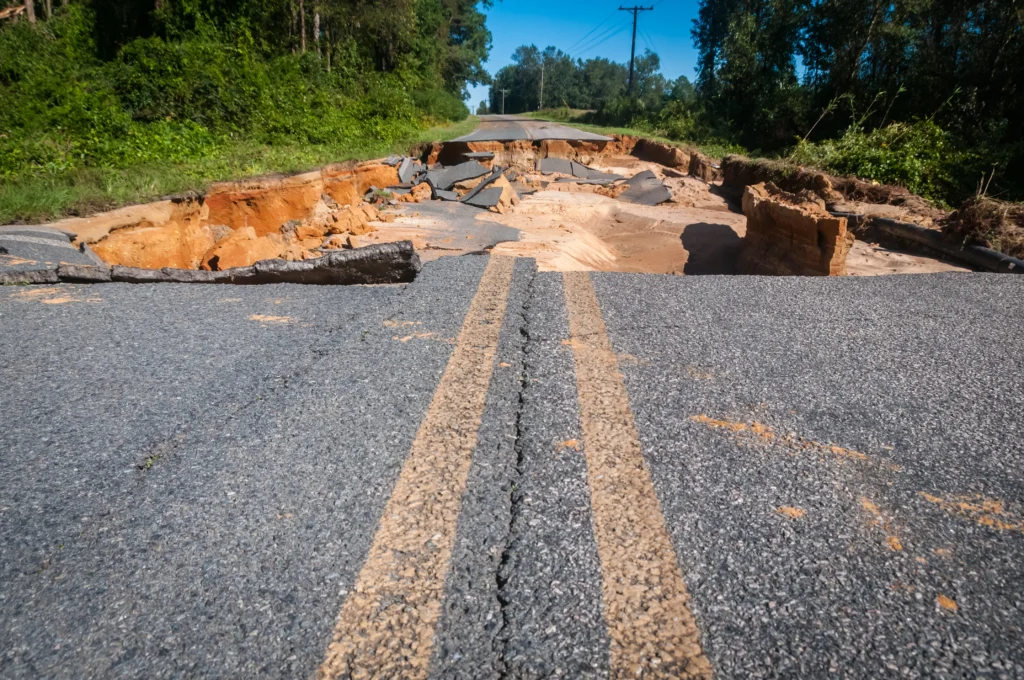A recent trip to Western North Carolina has the writer thinking about what we all have in common.

As North Carolinians, we know that all copperheads are venomous, but we seem to have forgotten that this is not true of most people. We group ourselves and others according to similarities – political ideologies, religions, geography, social identities, lived experience. We assign blanket attributes to all the people within those groups, but I suspect the only universal truth is that we are all born, pay taxes and die, as the saying goes.
I was reminded of that when I travelled to western North Carolina recently.
As I crisscrossed the Swannanoa River and hit the back roads of Buncombe, Madison, Yancey, and McDowell counties, there were reminders everywhere of the catastrophic flooding those communities experienced when Hurricane Helene hit nearly one year ago.
Most of the main roads have been repaired, but plenty of roads and bridges remain impassable. Some are simply gone. There are countless piles of tree debris, some two or three stories high, still waiting to be processed. Creek beds have shifted, changing the depth and path of the water in many places. Despite the new green growth covering the scars left by mudslides and raging water, the leaning trees, shifted earth, and large rocks strewn about still clearly show the paths of destruction. Empty foundations and piles of rubble sit where buildings once stood, a reminder of lives lost or forever changed.
Natural disasters don’t stop to ask your political affiliation or gender identity before they wipe you, your loved ones, and/or your hard-earned property off this earth.
For that matter, neither does poverty, disability, sickness, or addiction. We all fight those things within our families and our communities.
In that way,we all have much more in common than we think. I was reminded of this recently as my rural community in Caswell County came together to celebrate National Night Out. A few hundred folks came out for the bounce houses, free hot dogs, and the joy of fellowship. Even amid the hustle and bustle — kids running everywhere, a DJ cranking up the music, and cheers from the corn hole boards — people kept stopping me to express their appreciation for my last column, which ran in our local newspaper, The Caswell Messenger.
The message of my last column had resonated with them all – rural stories are important, their stories are important. I was struck by the fact that all those folks seemingly had little to nothing in common, or at least not according to all those labels we use to identify people: right, left, black, white, cis, trans, male, female, old, young, rich, poor.
We can choose to divide by those labels — or acknowledge our shared experiences and stories.
Most of the people I talk to in Caswell County, and beyond, just want to live their lives and care for their families.
They want the opportunity to earn a living wage that will allow them to cover their basic needs.
They want their children to grow up in a safe area and receive a good education that will prepare them to be productive members of society.
They want access to healthy food and quality healthcare.
They want to live their lives and lead their families in ways that align with their own values and beliefs without outside interference.
They want others to see and acknowledge that they exist, that they matter.
They want others to consider their perspectives, needs, and experiences.
They want to participate in making the decisions that impact them most.
It’s hard to understand why people who seemingly want the same things consider themselves enemies.
Of course, many of them are also afraid. They’re afraid of losing their jobs, of losing healthcare coverage, of not being able to survive, of their families not being able to thrive. They’re afraid of being misinformed or of their families being misguided. They’re afraid of things they don’t fully understand, things that challenge or contradict the familiar.
They’re also afraid of each other; afraid because social media and political campaigns tell them that the other side wants to see them suffer, that they are an enemy who must be defeated.
There’s plenty for us to be afraid of, but I don’t want us to be afraid of our neighbors too! They’re not copperheads. They’re not all venomous. I encourage you to spend some time getting to know your neighbors, even if they voted differently or fly a different flag.
When disaster strikes, we rely on our government to be adequately prepared and resourced to respond because community-level bake sales and raffles are not enough to rebuild roads or other critical infrastructure.
But when disaster strikes, it will not be the government that responds first; it will be our neighbors.
So don’t let the politicians convince you that we’re enemies.
They may stop by the rubble for a photo op, but our neighbors are the ones who will help us recover.
Shannon Moretz is the Regional Director of The Health Collaborative, working to advance health equity in the rural South, particularly in the Dan River Region. Follow her on Substack. This column is syndicated by Beacon Media and is available to republish for free on all platforms under Beacon Media’s guidelines. For comments, please write info@beaconmedianc.org.